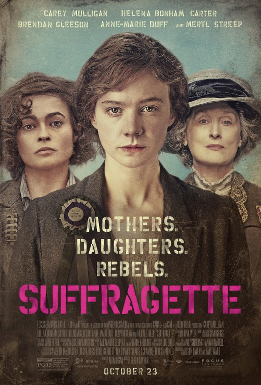It's a topic many US History classes breeze over. The fight for women's suffrage is one that doesn't usually get much screen time. Suffragette tells the story of women's suffrage across the pond, a history I'm not very familiar with but was glad to learn more about. It centers on Maud Watts (Carey Mulligan), a working class woman employed at a laundry factory, married to Sonny (Ben Whishaw) with a young son George (Adam Michael Dodd). Having worked in the factory since she was a young teenager, Maud knows no other life even though she makes less than her husband who works at the same factory. One day she encounters some suffragettes throwing bricks through storefront windows, and, as she learns more, she sinks deeper and deeper into the cause.
Much to the concern of her husband, Maud quickly becomes friends with Violet (Anne Marie Duff), a fellow factory worker, and Edith (Helena Bonham Carter), a local pharmacist. They introduce her to the writings of Emmeline Parkhurst (Meryl Streep), the most well known British suffragette. Maud starts to realize that she is no longer content with the injustices in her life such as the wage gap and mistreatment of the workers. Unfortunately, this also opens up a chasm between her and Sonny, who can't understand why she'd put her life at risk and leave her family to fight for the right to vote.
The most startling thing about the film is that it strikes you as both absurd and relevant. At the beginning, there is a voiceover from a government official arguing against women's suffrage, saying that women are too emotional, that they're already well represented by their husbands, and that if they get the right to vote, they may then want to (GASP) become members of parliament themselves! Throughout the film, higher authorities seem terrified at allowing women to vote, which in today's world seem preposterous.
Yet, it also seems incredibly relevant to the modern world. There are plenty of countries that still don't allow women to vote, as evidenced by a powerful list of dates that rolled during the credits, specifying in which year women were allowed to vote in a variety of countries. For instance, Switzerland didn't allow women to vote in national elections until 1971. Many times during the film, the word "suffragette" is treated like a dirty word, and at first Maud tries to disassociate herself from it because it implies radicalism and violence. Sounds very much like how we treat the word "feminist" today. Additionally, the arguments of women being a bad fit for government are still heard today when talking about female presidential candidates like Hillary Clinton.
Suffragette is a powerful look at how British women fought for their right to vote in the early 20th century. While it doesn't feature any women of color and Meryl Streep is basically only in one scene, it still packs an emotional punch. Not only do you see just how much suffragettes had to go through "“ from hunger strikes to being beaten by police to losing their children "“ it makes it that much more poignant that in some ways we're still fighting that battle today when it comes to wage gaps and women's health. It's worth a watch, if only to learn more about British suffragettes and to support a film that is written, directed, produced and acted by women.

